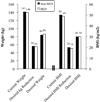Axis I psychopathology in bariatric surgery candidates with and without binge eating disorder: results of structured clinical interviews
- PMID: 21088923
- PMCID: PMC3085042
- DOI: 10.1007/s11695-010-0322-9
Axis I psychopathology in bariatric surgery candidates with and without binge eating disorder: results of structured clinical interviews
Abstract
Background: Prior studies have reached contradictory conclusions concerning whether binge eating disorder (BED) is associated with greater psychopathology in extremely obese patients who seek bariatric surgery. This study used the Structured Clinical Interview for DSM-IV Diagnoses (SCID) to compare rates of axis I psychopathology in surgery candidates who were determined to have BED or to be currently free of eating disorders. The relationship of BED to other psychosocial functioning and weight loss goals also was examined.
Methods: One hundred ninety five bariatric surgery patients completed the Weight and Lifestyle Inventory and the Beck Depression Inventory-II (BDI-II) and were later administered the Eating Disorder Examination. Of these 195, 44 who were diagnosed with BED, and 61 who were currently free of eating pathology, completed a telephone-administered SCID.
Results: Significantly more BED than non-BED participants had a current mood disorder (27.3% vs. 4.9%, p = 0.002) as well as a lifetime history of this condition (52.3% vs. 23.0%, p = 0.003). More BED than non-BED participants also had a current anxiety disorder (27.3% vs. 8.2%, p = 0.014) and lifetime anxiety disorder (36.4% vs. 16.4%, p = 0.019). BED also was associated with greater symptoms of depression, as measured by the BDI-II, as well as with lower self-esteem. BED and non-BED groups, however, did not differ in their desired weight loss goals following surgery.
Conclusions: The present findings indicate that the presence of BED, in patients who seek bariatric surgery, is associated with an increased prevalence of axis I psychopathology, beyond the already elevated rate observed with severe (i.e., class III) obesity.
Figures



References
-
- Kalarchian MA, Marcus MD, Levine MD, et al. Psychiatric disorders among bariatric surgery candidates: Relationship to obesity and functional health status. Am J Psychiatry. 2007;164:328–334. - PubMed
-
- Mauri M, Rucci P, Calderone A, et al. Axis I and II disorders and quality of life in bariatric surgery candidates. J Clin Psychiatry. 2008;69:295–301. - PubMed
-
- de Zwaan M, Mitchell JE, Howell LM, et al. Characteristics of morbidly obese patients before gastric bypass surgery. Compr Psychiatry. 2003;44:428–434. - PubMed
-
- Wadden TA, Sarwer DB, Fabricatore AN, et al. Psychosocial and behavioral status of patients undergoing bariatric surgery: what to expect before and after surgery. Med Clin North Am. 2007;9:451–469. - PubMed
-
- Sarwer DB, Wadden TA, Fabricatore AN. Psychosocial and behavioral aspects of bariatric surgery. Obes Res. 2005;13:639–648. - PubMed
Publication types
MeSH terms
Grants and funding
LinkOut - more resources
Full Text Sources
Medical

